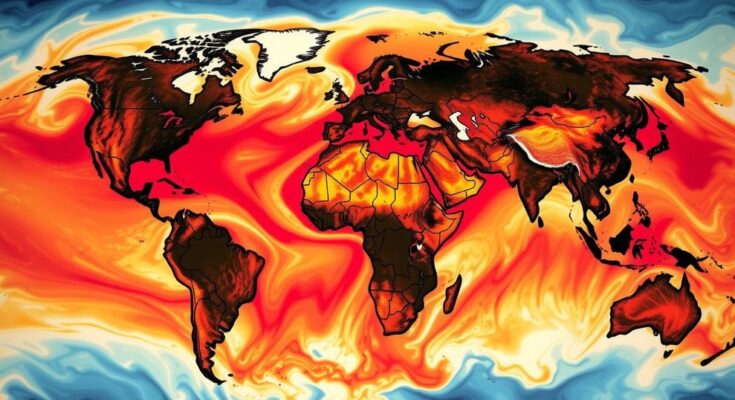The EU’s Copernicus Climate Change Service reported that 2024 was the first year global average temperatures exceeded 1.5 degrees Celsius above pre-industrial levels. All continents, save for Australasia and Antarctica, recorded their hottest years. The increase was exacerbated by the El Nino phenomenon and extreme weather events, underscoring the urgent need for action to mitigate climate change.
A recent report from the EU’s Copernicus Climate Change Service has declared that 2024 marked the first time in history that global average temperatures surpassed 1.5 degrees Celsius above pre-industrial levels. This alarming milestone was influenced by various climatic events, including extreme flooding in Pakistan and Afghanistan and a year-long drought in the Amazon, contributing to record low river levels. Additionally, Athens experienced severe heat, prompting afternoon closures of the Acropolis for tourist safety.
All continents, except Australasia and Antarctica, set records for the hottest year, with 11 months exceeding the crucial 1.5 degrees Celsius threshold. The rising temperatures continue a trend where all ten of the hottest years recorded have occurred within the last decade. Notably, while reaching this milestone is significant, it is critical to clarify that a single year exceeding 1.5 degrees Celsius does not equate to a permanent increase above the Paris Agreement’s long-term temperature objective. The current long-term average temperature remains approximately 1.3 degrees Celsius.
The report attributes some of the temperature increases to natural phenomena such as El Nino, which elevates ocean temperatures and influences weather patterns globally. This complex interplay between human-induced climate change and natural fluctuations means that while a warmer year is recorded, long-term averages may still remain below dangerous thresholds.
The consequences of climate change are becoming increasingly apparent, as evidenced by severe heatwaves and extreme weather events affecting populations, particularly in low-income countries. The report highlighted a noteworthy rise in atmospheric moisture, with rainfall in 2024 being 5 percent higher than the recent average. This uptick in moisture not only increases the likelihood of extreme rainfall events, but it also underscores the need for urgent action to mitigate greenhouse gas emissions and adapt infrastructure to withstand these unprecedented climatic extremes.
The report emphasizes the current state of the Earth’s climate, illustrating that 2024 was a pivotal year due to its record-breaking temperatures. The findings stem from comprehensive data analysis utilizing reanalysis methods that combine multiple observational sources including satellites and weather stations. The significance of this report cannot be understated as it aligns with global efforts under the Paris Agreement to limit temperature rise and illustrates the urgent need for mitigating climate change effects.
In conclusion, the 2024 records indicate a critical shift in our climate, with temperatures surpassing the alarming benchmark of 1.5 degrees Celsius for the first time ever. As extreme weather events become more frequent and intense, it is imperative for global leaders and scientists to prioritize actions that address climate change, emphasizing both emission reductions and adaptations to changing climate conditions. This report serves as a vital wake-up call to the global community about the accelerating impacts of human activity on climate dynamics.
Original Source: theprint.in




